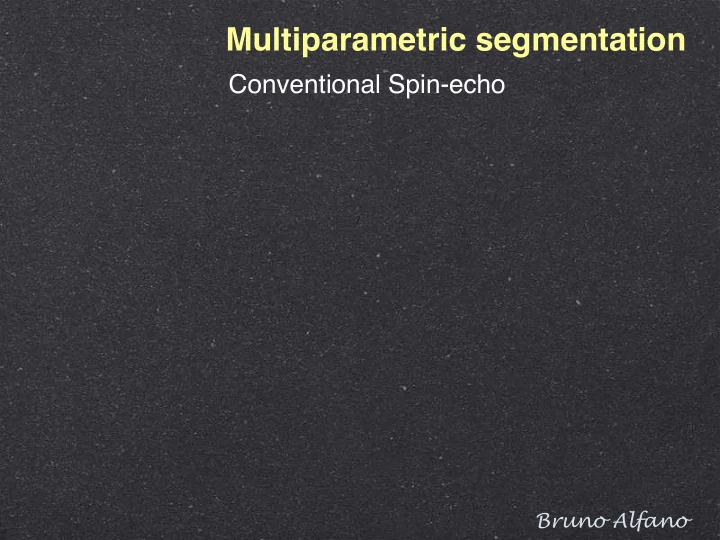

Multiparametric segmentation Conventional Spin-echo Bruno Alfano
The Method T1-w T2-w PD-w
Spin-echo signal Single echo: (TR TE 2)R1 TR R1 − − − ⋅ 1 2e e − + TE R2 − ⋅ S K N(H) e = • • • TR(R2 R1) − + 1 e + Double echo: − [TR − (TE1 + TE2)/2]R1 − (TR − TE1/2)R1 − e − TR ⋅ R1 S = K • N(H) • 1 − 2e + 2e • e − TE ⋅ R2 1 + e − TR(R2 + R1)
R1 R2 PD
Q M C I
Advantages: Cluster stability
Advantages: Good separation between Brain tissues
Advantages: Low sensitivity to RF inhomogeneity
Grey matter White matter Pallidus Putamen CSF Fat Muscle Segmented image
Validation WD (mean, ml) MR (mean±SD) MR Var. Coeff. Simulated GM 370 376±12 3.2% Simulated WM 639 611±17 2.7% Isotonic saline 441 443±11 2.6% Total 1450 1430±15 1.1%
Multiparametric segmentation Complete description in: Alfano B, Brunetti A, Covelli EM, Quarantelli M, Panico MR, Ciarmiello A, Salvatore M. Unsupervised, automated segmentation of the normal brain using a multispectral relaxometric Magnetic Resonance approach Magn Reson Med 37 (1) 84-93, 1997 Alfano B, Quarantelli M, Brunetti A, Larobina M, Covelli E M, Tedeschi E, Salvatore M. Reproducibility of intracranial volume measurement by unsupervised multispectral brain segmentation Magn Reson Med 39(3) 497-9, 1998 Principal applications in: Alfano B, Brunetti A, Larobina M, Quarantelli M, Tedeschi E, Ciarmiello A, Covelli EM, Salvatore M. Automated segmentation and measurement of global white matter lesion volume in patients with multiple sclerosis J Magn Reson Imaging 12 (6) 799-807, 2000 A Brunetti, A Postiglione, E Tedeschi, A Ciarmiello, M Quarantelli, E M Covelli, G Milan, M Larobina, A Soricelli, A Sodano, B Alfano. Measurement of global brain atrophy in Alzheimer's disease with unsupervised segmentation of Spin-Echo MRI studies J Magn Reson Imaging 11 260-266, 2000 Quarantelli M, Ciarmiello A, Morra VB, Orefice G, Larobina M, Lanzillo R, Schiavone V, Salvatore E, Alfano B, Brunetti A. Brain tissue volume changes in relapsing-remitting multiple sclerosis: correlation with lesion load. Neuroimage. 2003 Feb;18(2):360-6
Applictions: Ageing Alzheimer Disease Multiple Sclerosis
Age related changes Age related changes %G y = 0,53336 + -0,0013319x R= 0,68523 %CSF y = 0,031075 + 0,0015967x R= 0,65099 0,6 0,5 0,4 %G 0,3 0,2 0,1 0 0 10 20 30 40 50 60 70 80 Age
Age related changes Age related changes y = 0,42165 + -0,00031626x R= 0,20917 % W y = 0,015078 + 9,3152e-05x R= 0,24235 E/W 0,5 0,4 0,3 %W 0,2 0,1 0 0 10 20 30 40 50 60 70 80 Age
Applications: Aging Alzheimer Disease Multiple Sclerosis
EARLY-ONSET AD (n = 8) ALZHEIMER 0,6 %G %CSF 0,5 % GM 0,4 and CSF %G 0,3 0,2 0,1 0 10 20 30 40 50 60 70 80 Age Age
EARLY-ONSET AD (n = 8) % W ALZHEIMER 0,5 % Sostanza bianca 0,4 0,3 %W 0,2 0,1 Età 0 10 20 30 40 50 60 70 80 Age
Applications: Aging Alzheimer Disease Multiple Sclerosis
Multiple Sclerosis
GM Atrophy vs. Lesion Load 4% Δ f-GM (% ICV ) 0% -4% -8% y = -2.3x + 0.02 -12% R = 0.71 -16% 0% 2% 4% 6% f-Plaques (% ICV)
Major Advantages Uses diagnostic images (no need of extra acquisitions for segmentation) Fully automated Compatible with low-end scanners Includes fully automated segmentation of pathologic WM (MS plaques and leukoarayosis)
Major limitations 2 series nedeed Long acquisition times: 2 slice locations for whole brain coverage Movements between the 2 series Anisotropic spatial resolution
Recommend
More recommend